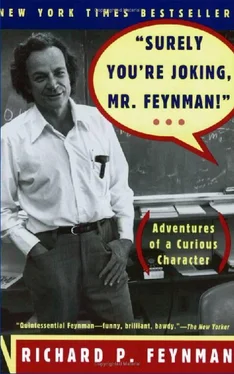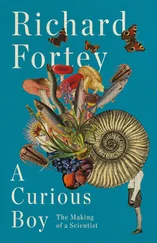“Aw!” he says. “Publicity is a whore!”
I was doubly taken aback.
I’ve since found out that Pais was right, but in those days, I thought it would be wonderful to have my name in Time magazine.
That was the first time I was in Japan. I was eager to go back, and said I would go to any university they wanted me to. So the Japanese arranged a whole series of places to visit for a few days at a time.
By this time I was married to Mary Lou, and we were entertained wherever we went. At one place they put on a whole ceremony with dancing, usually performed only for larger groups of tourists, especially for us. At another place we were met right at the boat by all the students. At another place, the mayor met us.
One particular place we stayed was a little, modest place in the woods, where the emperor would stay when he came by. It was a very lovely place, surrounded by woods, just beautiful, the stream selected with care. It had a certain calmness, a quiet elegance. That the emperor would go to such a place to stay showed a greater sensitivity to nature, I think, than what we were used to in the West.
At all these places everybody working in physics would tell me what they were doing and I’d discuss it with them. They would tell me the general problem they were working on, and would begin to write a bunch of equations.
“Wait a minute,” I would say. “Is there a particular example of this general problem?”
“Why yes; of course.”
“Good. Give me one example.” That was for me: I can’t understand anything in general unless I’m carrying along in my mind a specific example and watching it go. Some people think in the beginning that I’m kind of slow and I don’t understand the problem, because I ask a lot of these “dumb” questions: “Is a cathode plus or minus? Is an an-ion this way, or that way?”
But later, when the guy’s in the middle of a bunch of equations, he’ll say something and I’ll say, “Wait a minute! There’s an error! That can’t be right!”
The guy looks at his equations, and sure enough, after a while, he finds the mistake and wonders, “How the hell did this guy, who hardly understood at the beginning, find that mistake in the mess of all these equations?”
He thinks I’m following the steps mathematically, but that’s not what I’m doing. I have the specific, physical example of what he’s trying to analyze, and I know from instinct and experience the properties of the thing. So when the equation says it should behave so-and-so, and I know that’s the wrong way around, I jump up and say, “Wait! There’s a mistake!”
So in Japan I couldn’t understand or discuss anybody’s work unless they could give me a physical example, and most of them couldn’t find one. Of those who could, it was often a weak example, one which could be solved by a much simpler method of analysis.
Since I was perpetually asking not for mathematical equations, but for physical circumstances of what they were trying to work out, my visit was summarized in a mimeographed paper circulated among the scientists (it was a modest but effective system of communication they had cooked up after the war) with the title, “Feynman’s Bombardments, and Our Reactions.”
After visiting a number of universities I spent some months at the Yukawa Institute in Kyoto. I really enjoyed working there. Everything was so nice: You’d come to work, take your shoes off, and someone would come and serve you tea in the morning when you felt like it. It was very pleasant.
While in Kyoto I tried to learn Japanese with a vengeance. I worked much harder at it, and got to a point where I could go around in taxis and do things. I took lessons from a Japanese man every day for an hour.
One day he was teaching me the word for “see.” “All right,” he said. “You want to say, ‘May I see your garden?’ What do you say?”
I made up a sentence with the word that I had just learned.
“No, no!” he said. “When you say to someone, ‘Would you like to see my garden? you use the first ‘see.’ But when you want to see someone else’s garden, you must use another ‘see,’ which is more polite.”
“Would you like to glance at my lousy garden?” is essentially what you’re saying in the first case, but when you want to look at the other fella’s garden, you have to say something like, “May I observe your gorgeous garden?” So there’s two different words you have to use.
Then he gave me another one: “You go to a temple, and you want to look at the gardens …”
I made up a sentence, this time with the polite “see.”
“No, no!” he said. “In the temple, the gardens are much more elegant. So you have to say something that would be equivalent to ‘May I hang my eyes on your most exquisite gardens?’ ”
Three or four different words for one idea, because when I’m doing it, it’s miserable; when you’re doing it, it’s elegant.
I was learning Japanese mainly for technical things, so I decided to check if this same problem existed among the scientists.
At the institute the next day, I said to the guys in the office, “How would I say in Japanese, ‘I solve the Dirac Equation’?”
They said such-and-so.
“OK. Now I want to say, ‘Would you solve the Dirac Equation?’—how do I say that?”
“Well, you have to use a different word for ‘solve,’ ” they say.
“Why?” I protested. “When I solve it, I do the same damn thing as when you solve it!”
“Well, yes, but it’s a different word—it’s more polite.”
I gave up. I decided that wasn’t the language for me, and stopped learning Japanese.
The problem was to find the right laws of beta decay. There appeared to be two particles, which were called a tan and a theta. They seemed to have almost exactly the same mass, but one disintegrated into two pions, and the other into three pions. Not only did they seem to have the same mass, but they also had the same lifetime, which is a funny coincidence. So everybody was concerned about this.
At a meeting I went to, it was reported that when these two particles were produced in a cyclotron at different angles and different energies, they were always produced in the same proportions—so many taus compared to so many thetas.
Now, one possibility, of course, was that it was the same particle, which sometimes decayed into two pions, and sometimes into three pions. But nobody would allow that, because there is a law called the parity rule, which is based on the assumption that all the laws of physics are mirror-image symmetrical, and says that a thing that can go into two pions can’t also go into three pions.
At that particular time I was not really quite up to things: I was always a little behind. Everybody seemed to be smart, and I didn’t feel I was keeping up. Anyway, I was sharing a room with a guy named Martin Block, an experimenter. And one evening he said to me, “Why are you guys so insistent on this parity rule? Maybe the tau and theta are the same particle. What would be the consequences if the parity rule were wrong?”
I thought a minute and said, “It would mean that nature’s laws are different for the right hand and the left hand, that there’s a way to define the right hand by physical phenomena. I don’t know that that’s so terrible, though there must be some bad consequences of that, but I don’t know. Why don’t you ask the experts tomorrow?”
He said, “No, they won’t listen to me. You ask.”
So the next day, at the meeting, when we were discussing the tau-theta puzzle, Oppenheimer said, “We need to hear some new, wilder ideas about this problem.”
Читать дальше












